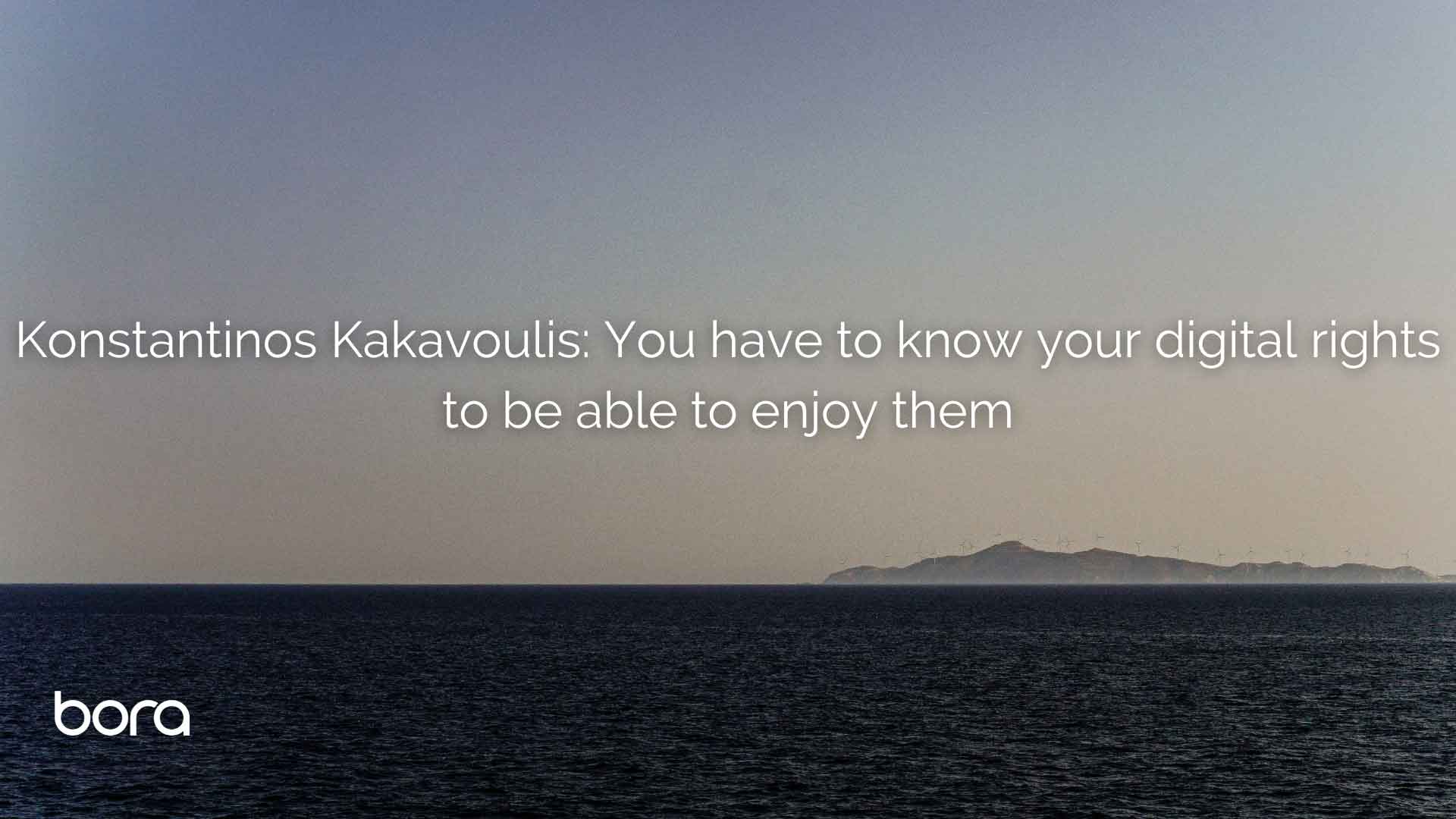As we are getting toward the end of 2022, I have saved my last interview of the year to be with Konstantinos Kakavoulis, co-founder of the non-profit, civil society privacy organization Homo Digitalis to talk about digital rights. Disclaimer: I am also a member of Homo Digitalis. Konstantinos is a Greek lawyer specializing in digital law and more specifically in data protectionWhat is Data Protection? Data protection refers to the practice of safeguarding sensitive information from unauthorized access, disclosure, alteration, or destruction. It involves implementing policies, procedures, and technologies to ensure... More and intellectual property. As you can understand, our conversation focused mostly on privacy issues, which are at the top of the news headlines lately.
The interview has been edited for brevity and clarity.
Let’s start by telling us a few things about Homo Digitalis.
Konstantinos: “Homo Digitalis is the first and only until today digital rights organization in Greece. It was founded back in 2018 by six young law professionals. We aspired to try to test the waters in Greece and see if there was a need for a digital rights organization, based on the example of other digital rights organizations in other countries. We found out very soon that there was a very big gap since there was no civil society organization devoted to digital rights in Greece.
We are very happy to be sharing our work with more than 130 members, who devote a lot of their skills, effort, and free time to the endeavors of Homo Digitalis. Homo Digitalis is dedicated to the protection and promotion of digital rights in Greece; therefore, our work consists of three pillars. First, we try to raise awareness regarding digital rights in our country. We believe that this is the first and most important step for the enjoyment of human rights. You have to know your rights to be able to enjoy them. In this regard, we visit schools all around Greece, conduct seminars in public institutions or companies, publish articles on our website, and we also create videos. We try to raise awareness in every way possible.
The second pillar of our work is to try to intervene wherever it is possible to enhance the protection of the rights in Greece, like in legal acts that are currently being drafted and voted on. Last, but not least, when we see that the violation of the legislation would undermine the digital rights of individuals or the whole Greek society, we take appropriate legal action to go against what is being done badly.”
We see a lot of developments in the privacy and data protection field, such as the Data PrivacyData privacy is the process of safeguarding an individual’s personal information, ensuring it remains confidential, secure, and protected from unauthorized access or misuse. More Framework between the EU and the US. What do you think are the prospects and the challenges around digital rights?
Konstantinos: “Well, let’s start with the challenges because they are easier to note. As the internet has no boundaries, this is a very big challenge that the law has to face for the first time in history. Until recent years, until the development of the world wide web, the law was able to regulate what would happen in a very specific territory. This could be a small, medium, or large size territory, but it would be very specific. Now, we have this great challenge of trying to regulate something that has no boundaries, which happens in the same way in many different jurisdictions. And it has become very difficult to find a way to regulate horizontally all these things.
What we are seeing is that the European Union has taken lots of initiatives in the past decade regarding privacy and data protection. However, on the other hand, we see lots of countries being left behind, having no, or very few legislative provisions for the protection of people’s rights. The United States is trying to keep up with this, although not at the pace it should, at least they are currently trying more seriously. Therefore, the challenge is how to regulate in a global environment because it does not make sense to just regulate the internet in the European Union.
This would partially improve people’s rights in the European Union only. We have to try to find ways to implement appropriately the legislation in the European Union, and also try to show, in a diplomatic manner, to other jurisdictions that they should also follow this path. These challenges can also be the prospects in digital rights, as we see more and more countries following the European example.”
Do you think that one problem is the fact that technology is running faster than law, so that the law is trying to always to catch up with technological developments?
Konstantinos: “The law tries to keep up with what is happening in the real world. In this case, it tries to cope with what is happening in the real and the digital world, which is another big challenge. I could envision many, many things being completely different than how we know them today not in 50 years, but in five or six years from now. The challenge is much bigger because technology runs much, much faster than how things in the real world would run. What we’re seeing is that we might be regulating one thing today and this regulation would be absolutely redundant in a couple of years, because things would have changed immensely.”
People often feel overwhelmed by the fast pace of changes in the technology ecosystem. Do you think that raising awareness for families and kids is the most essential part in protecting our data and privacy?
Konstantinos: “Today’s kids are what we call digital natives because they are growing in an environment where technology is an integral part of their daily routine. On the other hand, older adults are digital migrants; being connected to the internet came at some point in our lives and initially was more of a luxury than a necessity. What we have witnessed from our seminars at schools is that although children are embracing faster and easier technology advancements, and they are more open to discussing about technology, there is a big gap. They are not being provided with actionable information on how to use technology safely.
Children are willing to fill in this gap if they are provided with the correct information and guidelines. Therefore, it is also important to put this topic in the table of every family so that it becomes part of the daily routine. Parents should not be afraid to discuss these issues with their children. Although kids often know more about technology advancements, they are often unaware of the potential challenges and the ways to protect themselves. And this is where parents can help by building bridges with their children.”
What are the benefits for a business to protect the data that they store and process and transfer?
Konstantinos: “Although being compliant with GDPRWhat is GDPR? The General Data Protection Regulation (GDPR) is widely regarded as the world's strictest security and privacy law, promulgated by the European Union (EU) to regulate any organization... More is an obligation that can help you avoid huge fines, which may be up to 20 million euro per violation, I would not stop the discussion there. Compliance is a true opportunity for every company and organization.
If you want a company to be competitive, have a good reputation to keep your current clients, and, most importantly, attract more clientele, personal data protection must be respected within the company. We have seen many companies bigger or medium size conducting audits of their suppliers. If the suppliers are not found to be compliant with the personal data framework, they have to either fix all these criticalities by a very short deadline, which is extremely difficult, or they lose the contract they have. On the other hand, we have seen companies grow a lot because they are compliant with the data protection framework. This is a big opportunity to have more and happier clients.
In addition, it is a very good opportunity to review the procedures within the company, assess them and harmonize them with what you really need. It is therefore a big chance for organizational restructuring to become more productive and efficient in what you do.”
A recent survey by a big tech company in the UK demonstrated that citizens are trusting social media and governments less for the protection of their personal data. That reminded me of the cases with state surveillance not only in Greece, but also in countries like Spain and Poland. What is the real problem behind state surveillance and why don’t citizens trust their governments?
Konstantinos: “I think that what we are facing as societies in the Western world is serious problems in our institutions. And I think that this does not only apply to data protection, privacy, and digital law. This is a more general issue. This is why I think that people are losing their trust and their confidence in their governments. I don’t think that people are just losing confidence in their governments regarding their privacy and their data. I think that they are losing confidence and trust in general, if they can protect them if they can provide a framework where people and societies can live with safety and progress.
Regarding data protection and privacy, it is not just about surveillance through smartphones. We have seen an increase of state surveillance through smart policing and through smart border management. Law enforcement authorities have been trying to use new technologies to combat crime, and this as a starting point is good.
However, what we are seeing is that either there are big gaps in legislation, or the legislation is not respected at all. I firmly believe that what we need is more transparent procedures. Although the use of tools and software can be really useful in certain cases, such as to investigate a crime or to prevent a crime, these procedures must be very clear both to the people that would enforce them, but also to the people on whom these procedures might be enforced. I think that both governments and societies should collaborate to see where the shortcomings are today and try to address them because we cannot just claim to stop law enforcement authorities from using new technologies.
Try to see where the gaps are in the implementation of all these new technologies by the authorities. This would entail both legislative action and more practical initiatives. For example, we should see how police authorities are being trained regarding the use of these technologies. We should be very transparent on who has access to this information and for which reasons. Where all this data is being stored, for how long, how do we keep it protected, or if any third party has access to it? All these are questions that are unfortunately not being answered even today after all these cases. And this results in the loss of confidence and trust in public (and private) entities.”
As usual, here are four more personal (but not sensitive) questions to get to know Konstantinos a bit better.
Favorite food: “Seafood pasta”
Favorite place for vacation: “This is a tough one. Definitely somewhere in the Aegean. I would say Syros Island.”
Favorite book: “Christ Recrucified by Nikos Kazantakis.”
If you weren’t a lawyer, what would you like to be? “When I was young, I wanted to become a football manager. So, let’s stick to that.”
Thank you very much Konstantinos for the fun and insightful conversation.
Throughout 2022 I had the honor and pleasure to interview amazing people for bora and I have learnt a ton by talking to them – Jane Frankland, Jessica Barker, Andra Zaharia, Fareedah Shaheed and Liz Kelly, thank you all!!!



